east
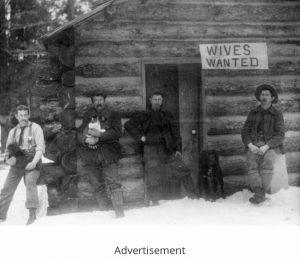 Most of us have either seen or heard of the television show called “The Bachelor.” The show is all about a single man in search of a bride. Of course, these days there are many ways to find the girl of his dreams, and most men would never go on television and let some reality show match him up with ten women for him to choose from. Of course, the idea of online dating sites is new and for some of us, still shocking too.
Most of us have either seen or heard of the television show called “The Bachelor.” The show is all about a single man in search of a bride. Of course, these days there are many ways to find the girl of his dreams, and most men would never go on television and let some reality show match him up with ten women for him to choose from. Of course, the idea of online dating sites is new and for some of us, still shocking too.
Many years ago, in the old west…especially during the gold rush days, the men in the west found themselves lonely…very lonely. They didn’t want to go back east, and few good women came to the west in those early days. Those were desperate times in the emotional lives of the gold rushers. The west was wild and unsettled, and even into the 1900s short on eligible women to marry.
There were no computers or smart phones then, and no dating apps or websites. So in an effort to find a wife, several eligible bachelors would stand in front of a log cabin, spiffed up as much as they could be, I suppose, many with beards, trying to let ok like a great catch. The photograph was then placed as an advertisement in papers back east. Personally, I don’t know if I would have been very inclined to jump on a train and head west to meet up with a man who was looking for a wife. Mail-order brides, sort of. These men would still have to woo the women, win them over, because these women weren’t slaves, and they weren’t required to stay. These bachelors would have to “sell” themselves and their lifestyle to these women, along with making the women fall in love with them.
I wondered, what kind of woman would answer such an ad. I don’t mean a loose woman, but likely a woman 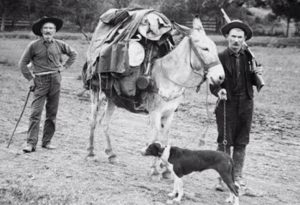 who was a little bit past the normal marrying age of that time. An eighteen year old girl would never be the one to go. Her parents would likely never let her, but s woman who was in her mid-twenties would be viewed as a spinster, usually a school teacher, so she could take care of herself. She could tell her family that she was taking a job in the west. I’m sure they would be upset, but it would be her choice. And her family would have known it. Some women had no one, so there might be nothing to stop them. Still, going into the unknown like that would be scary. I don’t know how many of these men successfully found wives this way, but I suppose that if even a few did, it would be a successful bachelor show…of the time, anyway.
who was a little bit past the normal marrying age of that time. An eighteen year old girl would never be the one to go. Her parents would likely never let her, but s woman who was in her mid-twenties would be viewed as a spinster, usually a school teacher, so she could take care of herself. She could tell her family that she was taking a job in the west. I’m sure they would be upset, but it would be her choice. And her family would have known it. Some women had no one, so there might be nothing to stop them. Still, going into the unknown like that would be scary. I don’t know how many of these men successfully found wives this way, but I suppose that if even a few did, it would be a successful bachelor show…of the time, anyway.
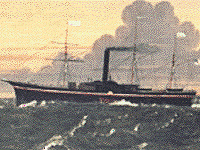 The San Francisco gold rush was a crazy time in American history. It was almost giddy in many ways. Gold does funny things to people. Just the thought of striking it rich made people pull up stakes and move west to try their hand at gold mining. Once people had made their fortunes, many decided to head back home to the east. Apparently the idea of wagon training back was not so appealing on the journey home, so these now, people of wealth decided to go by ship. The easiest crossing was through the Panama area. Of course, the Panama Canal was not built yet, although the French had tried to do so, but it wasn’t done yet. So the trip became a two ship journey.
The San Francisco gold rush was a crazy time in American history. It was almost giddy in many ways. Gold does funny things to people. Just the thought of striking it rich made people pull up stakes and move west to try their hand at gold mining. Once people had made their fortunes, many decided to head back home to the east. Apparently the idea of wagon training back was not so appealing on the journey home, so these now, people of wealth decided to go by ship. The easiest crossing was through the Panama area. Of course, the Panama Canal was not built yet, although the French had tried to do so, but it wasn’t done yet. So the trip became a two ship journey.
On August 20, 1857, several hundred passengers in San Francisco boarded the SS Sonora, of the Pacific Mail Steamship Line, and headed south toward Panama City. The 1857 value of the gold on board was 1.6 million, so just imagine today’s value. Thousands of freshly minted 1857-S double eagles, some earlier $20 coins, ingots, and gold in other forms were among the treasures. Some of the double eagles were stacked in long rows or columns and nestled in wooden boxes. Elsewhere around the ship, passengers had their own stash in purses and boxes reflecting their success in the land of gold. Once they arrived in Panama City, they were transported by train to on the Panama Railroad, which was a 48-mile line, completed in 1855 and had facilitated the crossing of the isthmus in about three or four hours as opposed to paddling and tramping through the jungles for several days. When the train arrived in Aspinwall, the passengers disembarked, and the treasure was transported to storage.
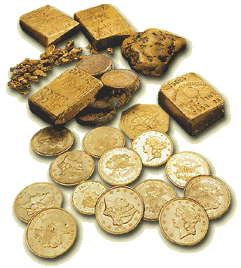 The next leg of the trip was aboard the side-wheel steamer SS Central America. The ship had been called the SS George Law, but the name was later changed to the SS Central America. It was now on its forty-fourth voyage for the Atlantic Mail Steamship Company. The Atlantic Mail Steamship Company was operating under federal mail contract to provide mail to the people between the east and west. The steamers had Navy captains at the helm, men of proven reputation and experience. Capt. William Herndon commanded the Central America.
The next leg of the trip was aboard the side-wheel steamer SS Central America. The ship had been called the SS George Law, but the name was later changed to the SS Central America. It was now on its forty-fourth voyage for the Atlantic Mail Steamship Company. The Atlantic Mail Steamship Company was operating under federal mail contract to provide mail to the people between the east and west. The steamers had Navy captains at the helm, men of proven reputation and experience. Capt. William Herndon commanded the Central America.
In early September 1857, the gold treasure was carefully packed aboard. The passengers found their cabins, and all were ready for the pleasant voyage to New York City. It was an ideal time of year for travel. A few days later, on September 7, 1857, the ship docked in the harbor of Havana. It was a popular stop for the passengers, who set about buying souvenirs and exploring the sights of the town. The trip toward New York continued to be pleasant. The skies were sunny and the sea smooth…temporarily.
At 5:30am on Wednesday, September 9, the ship’s second officer noted that the ship had gone 286 nautical miles in the preceding 26½ hours. He noted that a breeze was kicking up, and perhaps they were in for a storm, but expressed no concerns, because they were experienced and could handle a storm should it occur. That would prove to be the first mistake made. The storm grew furious and they were too far from a port to do much except keep the SS Central America into the waves. By Friday morning, September 11, the crew was still in control, but the ship was taking on water through the drive shaft, broken or open lights and elsewhere. The ship was tossing violently. It was virtually impossible to feed coal into the boilers.
At 11am Captain Herndon told the passengers that the ship was in grave danger. He enlisted the help of all men to bail water with a bucket brigade. By 1:00 in the afternoon the rising water in the hold doused the boiler 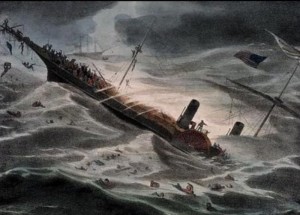 fires. The ship’s paddlewheels stopped. The SS Central America was at the mercy of the sea. By Saturday, the 12th of September, 1857, the storm started to pass, but it was too late. The SS Central America was doomed. The people were told to abandon ship, and the SS Central America went down with all of their treasure. In all, 425 lives were lost to the sea. Only 153 were pulled from a watery grave by the brig Marine, which was also damaged by the storm, though not to the degree of the SS Central America. The ship was discovered again on September 11, 1988, almost exactly 131 years after she went down in a hurricane on September 12, 1857. It was a rich find for Thomas G Thompson and his crew…and the museums who would reap much of the benefits.
fires. The ship’s paddlewheels stopped. The SS Central America was at the mercy of the sea. By Saturday, the 12th of September, 1857, the storm started to pass, but it was too late. The SS Central America was doomed. The people were told to abandon ship, and the SS Central America went down with all of their treasure. In all, 425 lives were lost to the sea. Only 153 were pulled from a watery grave by the brig Marine, which was also damaged by the storm, though not to the degree of the SS Central America. The ship was discovered again on September 11, 1988, almost exactly 131 years after she went down in a hurricane on September 12, 1857. It was a rich find for Thomas G Thompson and his crew…and the museums who would reap much of the benefits.
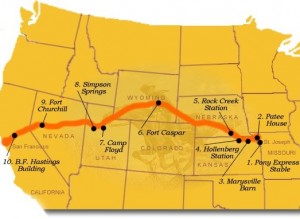 I often wonder how it must have felt to live in a time when so many things were changing in ways that man had not seen before. Things like the automobile, the airplane, the light bulb, the telephone, and the telegraph, all came into being between the 1800s and the early 1900s. Prior to these things, our world was rather primitive concerning things like travel, communication, and even the home life…at least by today’s standards, anyway.
I often wonder how it must have felt to live in a time when so many things were changing in ways that man had not seen before. Things like the automobile, the airplane, the light bulb, the telephone, and the telegraph, all came into being between the 1800s and the early 1900s. Prior to these things, our world was rather primitive concerning things like travel, communication, and even the home life…at least by today’s standards, anyway.
When families began moving West to find land and adventure, it was often a very sad time, because many of these people would not see their loved ones again. They might not even hear from them. This really seemed like an unacceptable situation for most of the people on both sides of that spectrum. The people needed to hear from their loved ones, and so like every other idea, from necessity came a solution…the Pony Express. Prior to the Pony Express, people might try to send a letter with a wagon train heading West to see of they could manage 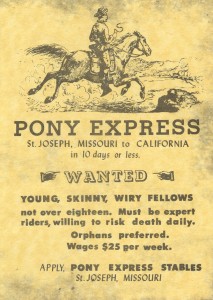 to get it to a loved one who had left a year or more before. Imagine the impossibility of that feat. The person with whom the letter was sent, might not even know the person to whom the letter was being sent. It meant asking around in the area they had planned to settle in, and if they had moved elsewhere…well that is the real definition of the dead letter.
to get it to a loved one who had left a year or more before. Imagine the impossibility of that feat. The person with whom the letter was sent, might not even know the person to whom the letter was being sent. It meant asking around in the area they had planned to settle in, and if they had moved elsewhere…well that is the real definition of the dead letter.
The Pony Express became the first dedicated postal service ever, on this day, April 3, 1860, but it was a far cry from the mail service of today, about which many of us complain. The men who chose to be Pony Express riders had to be told about what they might be riding into. There were Indians, who did not like the White Man. Treaties had been broken, and the White Man was considered an intruder on Indian land. To say that the White Man was not welcome in the West, was putting it mildly. Every time the Pony Express rider set out, he was taking on the risk of never coming back. The Help Wanted posters clearly stated the dangers, and the riders had to be single young men preferably under eighteen and preferably orphans!! Not a glowing help wanted ad, for sure, still there was a need, and these brave men took the challenge and made it work. The Pony Express was a short lived phenomenon, however, lasting just eighteen short months. I suppose something had to be done to make mailing a letter safer. At the point when the last Pony Express rider rode his route, the telegraph had somewhat 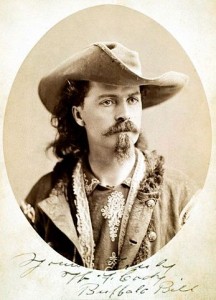 taken its place. Most what had been needed was to be able to let people about the death of loved ones and other urgent or important news, so it seemed like an unnecessary risk to place on these men, when a safe way had been found.
taken its place. Most what had been needed was to be able to let people about the death of loved ones and other urgent or important news, so it seemed like an unnecessary risk to place on these men, when a safe way had been found.
The first Pony Express rider to make the run has been a matter of dispute, but historians have narrowed it down to Johnny Fry or Billy Richardson. James Randall was credited with being the first Eastbound rider, heading out from San Francisco to Sacramento, and William (Sam) Hamilton took the mail from there to the Sportsman Hall Station, where he handed it off to Warren Upson. Other riders were Gus and Charles Cliff, Robert Haslam, Jack Keetley, Billy Tate, and the famous William Cody, known to most of us as Buffalo Bill. Together, these men rode into history as some of the bravest men who ever lived. Riding alone through dangerous territory, risking their lives to make life a little easier for the ever expanding nation we lived in.
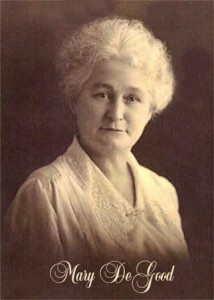 Since the beginning of this country, its citizens have been moving. We are a nation of pioneers. We came from many other countries to start a new life in a new land, and we seldom settle down in the place where we started, although, some do. Some of the pioneers in this country seemed, almost out of place in their new surroundings. When I look at pictures of some of my family’s ancestors, such as Mary DeGood, my husband’s great great grandmother, I see a woman, who had the innocence of many people had who started out life in the eastern part of our country, and later a strength that comes from living in the west. Many pioneer women seemed to take on the roughness of the west when they moved in the mid to late 1800’s, and there is nothing
Since the beginning of this country, its citizens have been moving. We are a nation of pioneers. We came from many other countries to start a new life in a new land, and we seldom settle down in the place where we started, although, some do. Some of the pioneers in this country seemed, almost out of place in their new surroundings. When I look at pictures of some of my family’s ancestors, such as Mary DeGood, my husband’s great great grandmother, I see a woman, who had the innocence of many people had who started out life in the eastern part of our country, and later a strength that comes from living in the west. Many pioneer women seemed to take on the roughness of the west when they moved in the mid to late 1800’s, and there is nothing 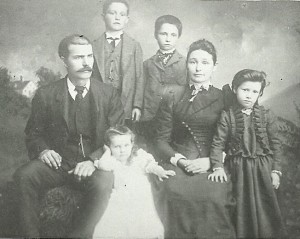 wrong with that, because it took a tough woman to make it in the west, just like it took tough men to make it in the west. Many of the people who came out west, couldn’t make it. They didn’t have the strength of character, or the physical stamina to handle this rugged country. Those who weren’t tough enough, went back home.
wrong with that, because it took a tough woman to make it in the west, just like it took tough men to make it in the west. Many of the people who came out west, couldn’t make it. They didn’t have the strength of character, or the physical stamina to handle this rugged country. Those who weren’t tough enough, went back home.
Bob’s great great grandmother had those qualities, and many people seemed to realize it, because she was well known and respected in the town of Prosser, Washington. It isn’t often that a woman is considered a pioneer in a community, but she was. Mostly, it is the men we think of when we think of pioneers, but 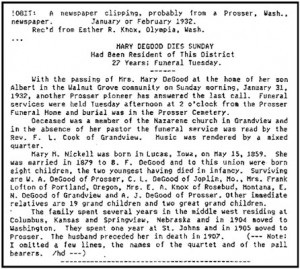 where would those men have been without their wives. While they probably wouldn’t admit it to their wives and families. They were the main reason men headed out west…to find a better life for them and their families.
where would those men have been without their wives. While they probably wouldn’t admit it to their wives and families. They were the main reason men headed out west…to find a better life for them and their families.
Still, it was a rare man who really made a good life in the west alone. They may have started out alone, but before long they knew they didn’t want to go on alone. That was a wise man for sure. Bob’s great great grandparents married and soon headed out west, finally settling in Prosser,Washington. The people of Prosser considered them to be pioneers of their town. They were respected and revered, and upon their passing, they were given a pioneer’s send off. A pioneer’s last call.
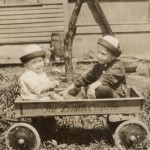
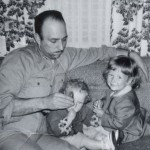 Remember when life was simple. You were a kid with no responsibilities. You went to school and then you went outside and played with your friends. Sometimes, when life gets to be too much and my stress levels are through the roof, I really wish that I could go back there again, but then I suppose many people do. Life wasn’t always so complicated. Back in the old west, people didn’t have so many places to go. Families spent time together. Kids seldom went to play at someone else’s house, and spending the night was something saved for trips back East to visit family that you had not seen for many years.
Remember when life was simple. You were a kid with no responsibilities. You went to school and then you went outside and played with your friends. Sometimes, when life gets to be too much and my stress levels are through the roof, I really wish that I could go back there again, but then I suppose many people do. Life wasn’t always so complicated. Back in the old west, people didn’t have so many places to go. Families spent time together. Kids seldom went to play at someone else’s house, and spending the night was something saved for trips back East to visit family that you had not seen for many years.
The kids in a family had really two places the went…school and church. Other than those places, they were at home, helping out around the place or doing their homework. With no television or radio, there was no big news story to occupy their minds. They used their imaginations to pass the time. Kids might pretend to have families, or they might pretend they were on a train to visit famiy, or maybe even fighting Indians, although I seriously doubt that many girls played that game.
Today, the kids get bored if they don’t have a video game to play, or the MP3 player playing their favorite tunes, or television coming up with newer and more exciting ways to entertain them. Reading books is almost a thing of the past, and I don’t mean because of the Kindle, which I consider to be a form of reading a book, but because they would rather watch a show on television than read about it. Their imaginations don’t seem to be able to take them into the book like we used to be able to do. It’s all about what action is put in front of their eyes, not about turning words into pictures in your imagination.
Now, life is so hectic. Most people have several places to be right after work, 
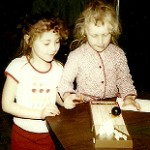 and they can’t go home for an hour or more after they get off work. Dinner is often late, or picked up at a fast food joint along the way. There is just no time for a home cooked meal, unless maybe it is on the weekend or in a crock pot. No wonder TV Dinners became so popular…and the microwave, of course. I mean who has time to cook stuff in the oven either. No one!! Life was so simple then…what happened?
and they can’t go home for an hour or more after they get off work. Dinner is often late, or picked up at a fast food joint along the way. There is just no time for a home cooked meal, unless maybe it is on the weekend or in a crock pot. No wonder TV Dinners became so popular…and the microwave, of course. I mean who has time to cook stuff in the oven either. No one!! Life was so simple then…what happened?
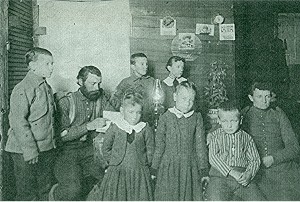 Back in the late 1800’s, life in the United States was rugged, especially if you didn’t live in the East. The people who lived here had a pioneer spirit, and they were used to making their own way. That didn’t necessarily mean that they were poor, although some lost everything they had. The amazing thing about that is that even if they did lose everything, many of them found a way to start over, and didn’t move back to the East.
Back in the late 1800’s, life in the United States was rugged, especially if you didn’t live in the East. The people who lived here had a pioneer spirit, and they were used to making their own way. That didn’t necessarily mean that they were poor, although some lost everything they had. The amazing thing about that is that even if they did lose everything, many of them found a way to start over, and didn’t move back to the East.
It was that pioneer spirit in those early settlers of this nation. They proved they had what it took to make a life in a rugged and sometimes brutal land, that they had the guts to turn this land into the great nation it is today. There are still people out there like that today. People like my cousin, Shirley and her family who live in the mountains of Washington state, and when I say they live there, I mean they live mostly off the land. They hunt and fish, and they grow a garden. That pioneer spirit still lives strong in them.
Our Great Grandpa And Grandma Spencer raised their 6 children in various places, but at this point in their lives, they were living near Rock Falls, Wisconsin, the old O’Dell place, which is another thing I find funny. It seems like once a family lives on a place, it always belongs to them, or at least their name always belongs to the place. So, no matter how many families followed the O’Dell’s, the house would always carry their name. That was a tradition I never could figure out, but it still seems to be the case.
Our great grandparents and great great grandparents built this country with their blood, sweat and tears, and most importantly with pure gut! They had what it takes to make it in a land that could be brutal enough to kill a man, much less a woman, if they weren’t strong enough.
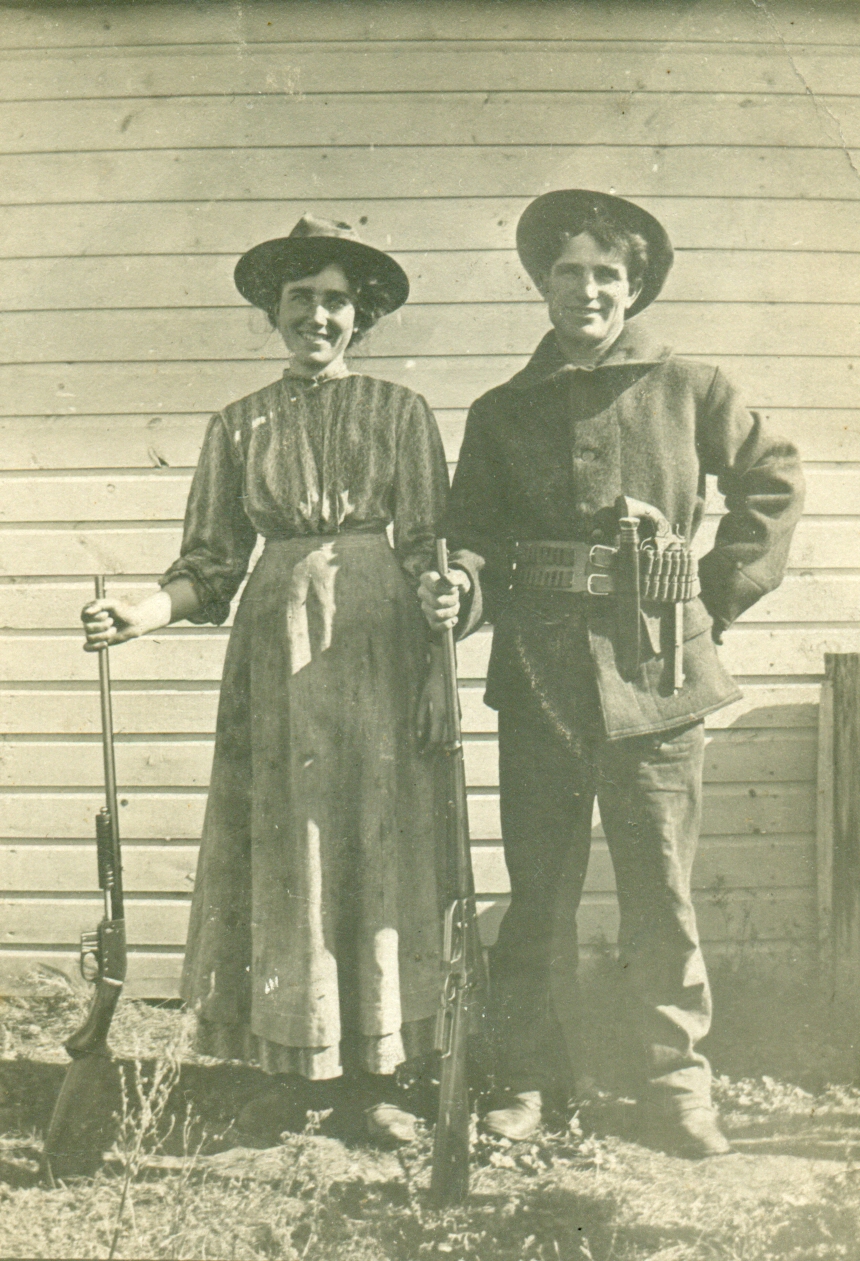 When I was a kid, I thought that mostly men carried or used guns…probably because I watched too many old Western shows in which the women were portrayed as weak and needing protection. The only women who carried or used guns were looked upon like…well less than womanly…I mean most of those women were outlaws who wore mens pants for Pete’s sake. The only time the women in the Old West movies used a gun was when there was no other choice, and no man around to save her, and even then, she usually lost the fight, unless she was the main star. Needless to say it was probably a pretty warped view of the women of the West on my part.
When I was a kid, I thought that mostly men carried or used guns…probably because I watched too many old Western shows in which the women were portrayed as weak and needing protection. The only women who carried or used guns were looked upon like…well less than womanly…I mean most of those women were outlaws who wore mens pants for Pete’s sake. The only time the women in the Old West movies used a gun was when there was no other choice, and no man around to save her, and even then, she usually lost the fight, unless she was the main star. Needless to say it was probably a pretty warped view of the women of the West on my part.
Of course, now that I am older, I know that this portrayal was very incorrect. The women of the Old West were a tough lot. They might have been looked at by people from back East as less than womanly, but times were changing, and women had to be tough to survive in the Old West. The men who came to settle the West needed women who could work side by side with them and who were tough enough to take care of themselves when the men were away. Only the most determined women were going to be able to make it here. Things have changed some now. There are probably as many women back east that can handle a gun as there are women out west who can. Womem are active in many careers that require them to carry a gun on a regular basis, and be tough enough to go up against the men they must to survive, whether it be in war or law enforcement.
My grandmother was one of those women who was able to handle a gun, and while they never moved as far west as my dad and my aunts did, they did not live in the east either. Wisconsin and Minnesota were wilder places back then, and even in North Dakota in the early 1900’s there was need for a gun. Of course, mostly the guns were used for hunting, but had the need ever arisen, my grandmother would have taken on man or beast to protect her children. She was one tough lady, who worked hard on the farm, and raised her children right, and I am very proud of all she did. I only wish I had been able to know her, but I was only 3 months old when she left us on July 11, 1956. I look forward to getting to know her in Heaven, because I’m sure she will have some stories to tell.
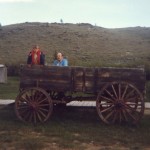 My dad always loved teaching his family about the history of this great country. He and my mom decided early on that they wanted to show us the country we lived in, and they most certainly did. We traveled from one coast to the other, from the north to the south. Dad would stop at every historical marker he could find along the way. We would get tired of stopping at all the markers, but from that we learned about things like the Oregon Trail…a trail that I’m pretty sure I have seen every marker for…but one that I know all about too.
My dad always loved teaching his family about the history of this great country. He and my mom decided early on that they wanted to show us the country we lived in, and they most certainly did. We traveled from one coast to the other, from the north to the south. Dad would stop at every historical marker he could find along the way. We would get tired of stopping at all the markers, but from that we learned about things like the Oregon Trail…a trail that I’m pretty sure I have seen every marker for…but one that I know all about too.
He took us to Gettysburg, and we walked through the battlefield in hushed silence, because you can almost physically feel that this is hallowed ground…that the men who died there…who shed their blood to 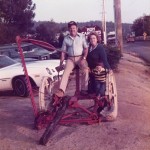 purchase freedom for all men…changed that place. Once you have been there and walked that place, you can never feel the same about a war that threatened to rip our country apart. And yet we remained, strong and determined.
purchase freedom for all men…changed that place. Once you have been there and walked that place, you can never feel the same about a war that threatened to rip our country apart. And yet we remained, strong and determined.
Dad told us about the old west, and the cost of settling this country. Families that traveled by covered wagon, westward to find a better life for their families, because there was room to grow out in the west. Room to farm and ranch and carve out a living that was unavailable in the east, which was much too crowded. The settlers were people who longed to find out what was over the next mountain top. Adventurers who wanted freedom to make their own rules.
He taught us about the gold rush in the Black Hills, and then showed us how so much 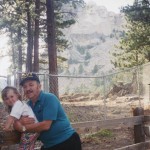 history still remains in the Black Hills. It became a place our family loved to go, and to this day Bob and I go over every year. It just has a hold on me…a draw that I can’t totally explain. I am always in awe there. The beauty of the hills, memorials, the 1880 train, and the old west shows in Keystone. I never get tired of being there.
history still remains in the Black Hills. It became a place our family loved to go, and to this day Bob and I go over every year. It just has a hold on me…a draw that I can’t totally explain. I am always in awe there. The beauty of the hills, memorials, the 1880 train, and the old west shows in Keystone. I never get tired of being there.
Dad and Mom took us and later our kids to so many places and showed us so many things. It is something we will always be grateful for, and that we can never thank them enough for. They gave us something no teacher or classroom could have taught us…they gave us a little piece of history.

